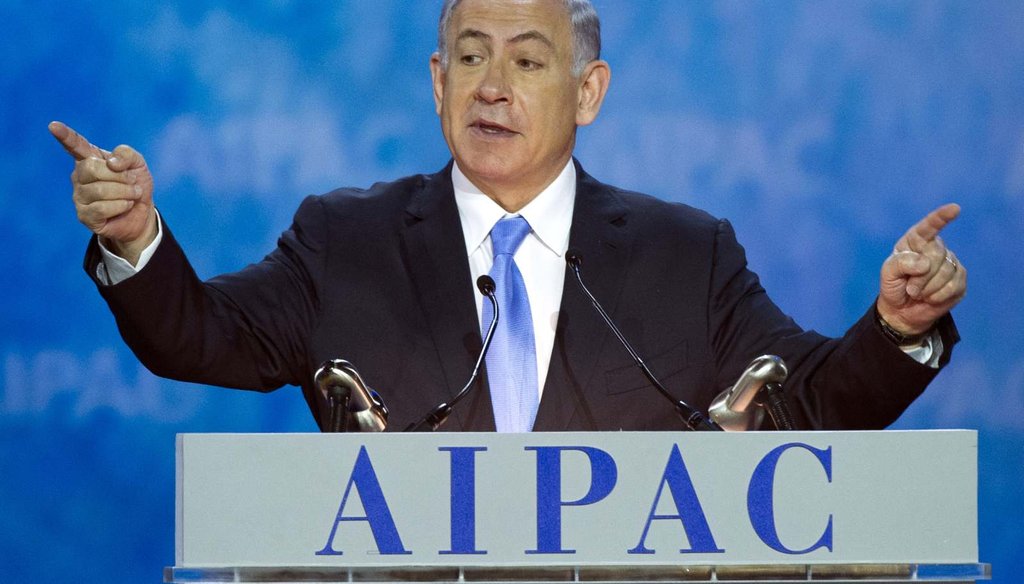Get PolitiFact in your inbox.

Israeli Prime Minister Benjamin Netanyahu gestures while speaking at the 2015 American Israel Public Affairs Committee Policy Conference in Washington, March 2, 2015. (AP Photo/Cliff Owen)
At the forefront of Israeli Prime Minister Benjamin Netanyahu’s visit to Congress is the fact that Netanyahu and President Barack Obama don’t see eye-to-eye on Iran.
House Speaker John Boehner invited Netanyahu earlier this year, angering the White House and many others. The White House holds that Boehner broke with protocol -- dealing with foreign leaders is the executive branch’s job -- and that has further damaged the relationship between Israel and the United States. The invitation was also seen as a political move, because Netanyahu is up for re-election this year, and the House floor is a sizeable pulpit.
Netanyahu -- like many Republicans -- is skeptical that an eventual deal with Iran over its nuclear capabilities will be strong enough to deter weapon development. The United States’ most recent round of negotiations with Iran over their nuclear program began in November 2013.
Obama has defended the negotiations in interviews as productive.
"Over the last year and a half, since we began negotiations with them, that's probably the first year and a half in which Iran has not advanced its nuclear program in the last decade," Obama said in a December 2014 conversation with CNN’s Candy Crowley.
Obama’s comments were largely accurate, according to experts. The agreement signed in November 2013 has made it harder for Iran to produce weapons-grade nuclear material, we found. International observers report that Iran complied with the terms of the temporary agreement. The amount of enriched uranium is less, and the country’s facilities to produce weapons-grade material has been curtailed.
But that does not mean the country has completely stopped all activities that could produce nuclear weapons material in the future, experts told us. There is also concern about broader aspects of a nuclear weapons program, such as weapons design and missile development. We rated Obama’s claim Mostly True.
About a week later, Stephen Hayes of the conservative Weekly Standard magazine, said nearly the opposite -- that "We've caught Iran cheating on the interim (nuclear) deal."
Actually, we haven’t caught Iran cheating. The International Atomic Energy Agency has reported no violations with the Joint Plan of Action.
That said, Iran has worked with a new kind of centrifuge that, while not a formal violation, contradicts the United States’ understanding of the deal. When confronted about it, Iran stopped its work. Also, there is some question about whether Iran is violating the agreement by exporting too much oil. That’s another murky issue; the exact terms that govern Iran's oil exports aren’t public. Overall, we rated Hayes’ claim Mostly False.
The five permanent members of the United Nations Security Council — China, France, Russia, the United Kingdom and the United States — along with Germany, hope to strike a permanent deal with Iran by June 2015.
In the deal currently underway, there exists an odd paradox: Negotiators want to limit the number of centrifuges Iran can have -- but under these limitations, the country would have enough centrifuges needed for a weapon but too few for a nuclear power program.
Former CIA deputy director Michael Morell made the point on Charlie Rose in February. "If you are going to have a nuclear weapons program, 5,000 is pretty much the number you need," Morell said. "If you have a power program, you need a lot more. By limiting them to a small number of centrifuges, we are limiting them to the number you need for a weapon."
Experts agreed that Morell has his facts right. A power plant requires tons of fuel each year. A bomb requires about 25 kilograms of U-235 enriched to the 90 percent level. If an agreement limits Iran to about 5,000 centrifuges, that would be sufficient to produce enough bomb-grade material but would leave Iran well short of the capacity to generate fuel to power nuclear power plants. We rated the claim True.
How long has the United States had a tough relationship with Iran? MSNBC's chief foreign affairs correspondent Andrea Mitchell said that Iran was "more or less an American ally" in 2002, until then-President George W. Bush listed it as a member of the Axis of Evil. This isn’t quite right.
While Iran provided critical assistance in the military defeat of the Taliban in Afghanistan and helped undermine al-Qaida, this cooperation did not reflect deeper ties. It was a moment when both countries sought similar goals in one country. With due regard for the ambiguity in Mitchell’s words, we rated the claim Half True.
Sen. Marco Rubio, R-Fla., has said Americans need to remember that Iran’s leaders have expressed animosity toward both Israel and the United States. "Iran's Supreme Leader (Ali) Khamenei, who will oversee implementation of this agreement, was calling Israel a 'rabid dog' and accusing the United States of war crimes," Rubio wrote in November 2013 press release. That’s right.
Based on expert translations, we confirmed that Khamenei referred to either Israel or the Israeli government as the animals of the Middle East. In the same speech, he criticized the United States, saying they "continue to commit crimes" in Afghanistan, Pakistan, Iraq and Guantanamo Bay. We rated Rubio’s statement True.
Our Sources
See individual fact-checks for sources.





















































